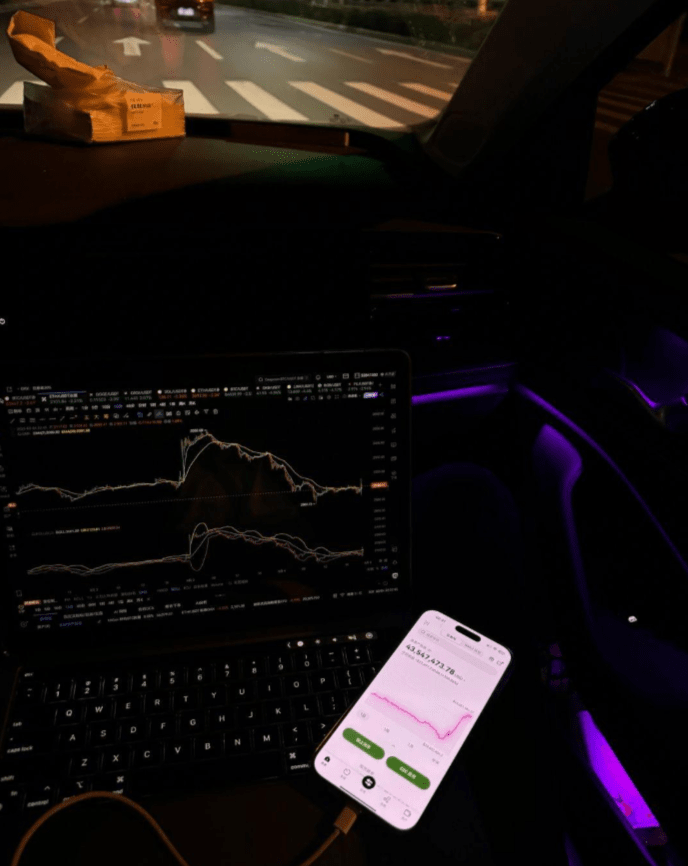Success is by no means accidental. Every successful person has gone through countless trials and has walked step by step to achieve it. It cannot be denied that some people are born geniuses, but such individuals are very rare, not you and not me. Most people, after experiencing continuous failures, gradually move towards perfection. It is precisely these experiences of failure that reveal many feelings and insights that shortcuts cannot provide.
A common saying is that there are no good opportunities; in fact, opportunities are reserved for those who are prepared. When the opportunity arises, one must be ready to seize it firmly. Waiting idly like a farmer waiting for a hare will lead to either missing the opportunity or failing to grasp it when it appears before you.

In-depth good articles! After ten years of the digital currency journey, I have distilled six undefeated principles, concise yet filled with wisdom. For those eager to succeed in the cryptocurrency market, as retail investors, learning from predecessors' experiences is a shortcut that helps you avoid pitfalls. Please like and save for future reference.
Entering the cryptocurrency realm, the primary task is to maintain a clear understanding of the operational logic behind each transaction. New coins emerge like bamboo shoots after the rain, often hiding the layouts of large holders who profit from market fluctuations. As a newcomer, one must have self-awareness, realizing that they might be the 'grass waiting to be harvested,' but there is no need to fear; this is a trial ground for growth.
Once you muster the courage to take the first step, victory is already waving at you. The word 'destiny' is viewed as an excuse by the weak, while the strong humbly regard it as support; what truly changes destiny is not chance encounters, but the courage to seize good opportunities, and our proactive attitude. Destiny is never biased but favors those who 'strive relentlessly'!






In summary, the cryptocurrency market is a fertile ground of opportunities and challenges. To establish yourself and thrive, you must master how to self-preserve in a rapidly changing market while keenly capturing every potential opportunity. May my insights and lessons serve as guiding lights on your journey, illuminating the path ahead.
Making money in the cryptocurrency market is not based on luck:
The essence of making money in the cryptocurrency market boils down to four differences:
First, the information gap—what I know, you still don't know.
Second, the cognitive gap—what I understand, you have not yet grasped.
Third, poor execution—I understand, but I dare to act, while you are still hesitating.
Fourth, competition is low—I am doing it, but I do it faster and better.
In the cryptocurrency market, winners are often not the smartest.
But rather, those who can see the direction clearly in chaos, maintain their mindset, and act decisively.
Real opportunities belong to those who can continuously learn, adapt to the market, and dare to take action.
Therefore, recognize the gap and improve yourself.
In the end, those who outperform the market are always the ones who excel in cognition and execution.
Retail investors, wake up! Poor position control renders even the best technology useless.
In investing, many retail investors often overlook a key factor—position control. Very few retail investors can truly master position control.
Making money is by no means based on luck, but rather a long-term accumulation of experience and skills. If you cannot control your position well, you can really lose to the point of questioning life. Position control is considered the key to investment survival, unless you are completely indifferent to liquidation. Especially with recent market fluctuations being dramatic, with over 10,000 points of volatility in a single day, how many people's positions can withstand such shocks? Remember, only by surviving in the market can you have a chance to profit!
In trading, position control is as important as technical analysis. No matter how skilled the technology is, poor position control renders everything futile. After opening a position, where should the liquidation line be set? Can each trade achieve a high risk-reward ratio? Is there enough room reserved for averaging down? These questions are crucial.
Investing is not something that happens overnight; don't always think about getting rich overnight or making a windfall in one go. Position control is a long-term process; the money in the market is never fully earned, but it can easily be lost.
Today I will give you practical tips, the words are few, but each one hits home; after reading, you will have an epiphany!
1. Just entering the market, don’t rush to earn money; learn quickly. If you can't even understand the risk of an exchange collapsing, how assets cross chains, and the concept of blockchain, how can you possibly make money?
2. Make more mistakes, practice diligently, and ask fewer people. There are 101 opinions among 100 people in the cryptocurrency market; speculators think investors are fools, while speculators view investors as parasites. A says this project is a great innovation, B thinks it's just a conceptual machine, C says both are scammers... Who to believe? Trust no one; scammers are everywhere in the market, ready to provide enticing services to newcomers. Moreover, 99% of the people in the cryptocurrency market are amateurs; who to trust?
3. The circle is very important. 99% of group chats, in my opinion, are comparable to the level of elderly men in the village park, focused on casual chatting and occasionally showing profit screenshots, which is actually quite meaningless. A quality circle can at least let you see the facts of the cryptocurrency market; what do you think?
4. Investment is your own business. What does this mean? It means that in investments, you ultimately have to rely on yourself. Others' analyses and thoughts are only for reference; you need to conduct independent research, form your own investment framework, and only with a framework can you have your own opinions. Don't care what others say; they may not be better than you.
5. Contracts, short-term, holding coins, or NFTs—which is best? The best is what suits you; currently, our group strategy focuses on holding coins, and if you have enough energy, I can lead you to earn from contracts. Some say contracts, short-term, NFTs; to be honest, they are all looking for you to take the losses.
6. How can you find a hundredfold coin? If you don't even understand the basic concepts and have no clue about the market, but keep asking around, this mindset will never lead you to find a hundredfold coin; you might as well be shot. I want to emphasize that making money in this market is not that easy; those who find it easy won't make any money. If someone wants to argue that someone bought a hundredfold coin and the contract is so many times, that person is likely a scammer.
7. Patience is the foundation of making money. You may have to learn for a long time and be scammed countless times to understand the situation in the cryptocurrency market; it's fine, cherish every experience of being scammed, as these are lessons to be learned on the investment road.
8. Adhere to the basic rules of the cryptocurrency market. If you lose, acknowledge it; if you are scammed, accept it. Skilled players often do not complain, while the weak tend to blame others for being scammed and complain about unfair rules. When you have no ability to set rules, stop whining.
9. Learn while practicing. Some people say, 'I've learned so many concepts and I understand them, but it's still abstract.' That's not right; you should learn while practicing, experiencing various projects. Of course, output is the best practice. You can also produce content to attract friends and exchange ideas.
10. As long as you put in the effort, you can always become a big player. I say this, and many people may disagree, thinking it's nonsense. How many people are still just crops? Remember, others being crops has nothing to do with you; you need to focus on improving yourself. Nothing is difficult in this world; only the earnest are feared. If you want to argue, refer to the second rule.
Don't trip in the same place a second time; that way, you can grow quickly.
The secret for ordinary people in their 20s and 30s to earn millions in the cryptocurrency market.
If you plan to invest in the cryptocurrency market, please take a few minutes to read this answer from Qing Tian without missing a word, as it might save your life and your family.
Thousands of originally happy families ultimately become broken, stemming from the pursuit of an unreachable dream of making a fortune in the cryptocurrency market. On sunny days, if you really want to continue on the path of trading, you still need to study diligently; in addition to understanding the basics, you should also analyze news and study technical indicators.
If you do not conduct in-depth research and reasonably plan to manage your money, your funds will only be worn away. In the end, as a completely ungrounded retail investor, you will only joyfully enter and sadly exit the market. Some well-known technical indicators have been passed down for a reason. For example, MACD divergence signals, KDJ overbought and oversold signals, support and resistance signals, etc. While they cannot guarantee profits, they allow you to quantitatively analyze in a relatively mature pattern, giving investors a basic direction.
How to quickly roll from 10,000 to 10 million in the cryptocurrency market?
In the cryptocurrency market, if you want to turn 10,000 into 1 million, the only feasible method is to roll positions!
When you save up to 1 million, the feeling of making money is completely different—just trading spot, a 20% increase can earn you 200,000, which is the income of an average person for a year. Moreover, being able to roll small funds into 1 million means you have already grasped the logic of making money, and your mindset will be steadier. Just replicate successful patterns, and wealth will naturally snowball.
Don't always think about millions or billions; first, ground yourself in reality. The key to rolling positions is to wait for certainty opportunities and make a full effort, rather than trading frequently. As long as one successfully rolls positions three or four times in life, one can rise from an ordinary person to a millionaire!
The core point of rolling positions:
1. Be patient and wait for big opportunities!
• The profits from rolling positions are extremely impressive; as long as you succeed a few times, earning millions or even billions is not a dream, so you must not mess around; wait for high win-rate opportunities to take action.
2. What is a high-certainty opportunity?
• Cryptocurrency price crash + sideways fluctuation + trend reversal upward breakthrough.
• This moment is the best time to enter; the success rate is extremely high!
3. Only trade in uptrends; do not engage in downtrends!
How to execute rolling position strategies?
Example: You have 50,000 in principal, how to operate?
• Open 10x leverage when BTC is at 10K, using a staggered approach, opening 10% of the position (5K margin).
• Equivalent to 1x leverage, set 2% stop-loss, maximum loss 1,000.
• If BTC rises to 11K, add a position by 10%, continue to set a 2% stop-loss.
• Even if you stop-loss at this point, you are still overall profitable by 8%.
• If BTC rises to 15K and everything goes smoothly, profits can reach over 200,000.
• If you catch two similar market trends, you can go from 50,000 to 1 million!
Why is rolling positions safer than ordinary trading?
Rolling positions is not about randomly gambling, but gradually increasing your funds, allowing your principal to grow steadily, and strictly setting stop-loss levels to control risks. Compared to blindly using high leverage, this approach has a higher and steadier win rate.
Fund management is crucial!
• Futures account = 10% of spot assets (for example, if you have 300,000 in spot, take 30,000 for futures).
• Futures account wiped out? Doesn't matter! Use spot profits to fill in the gaps; this way, you will never be eliminated by the market.
• Once profitable, regularly withdraw part of the funds to secure your earnings.
The real wealth code: Small funds should not engage in short-term battles but should steadily double!
Many people mistakenly believe that small funds should earn quick money in the short term, but in fact, small funds are better suited for mid-to-long-term investments to double their growth.
• A piece of paper folded 27 times can reach a thickness of 13 kilometers; if folded 37 times, the Earth cannot contain it!
• Principal 30,000? Don't think about earning 10% every day, but rather how to achieve several doubles and roll it to 500,000!
Making money in the cryptocurrency market relies on strength; accurate judgment plus steady operation is the way to go! No matter how volatile the market is, I remain calm; position control is in place, and when the trend comes, I will firmly grasp it!
Eight golden rules summarized from ten years of cryptocurrency trading | Investment discipline that even novices can understand:
After ten years of ups and downs in the cryptocurrency market, from liquidation to steady profits, I’ve summarized these practical experiences to help newbies avoid pitfalls. This text has no fluff, only pure insights! (Includes operational checklist)
1 [Idle Money Investment Principles|Invest with funds that do not affect your life].
Always use only 10%-20% of disposable funds for trading; for example, if you have 100,000 in savings, at most take 20,000 to enter. I’ve seen too many people risk all their assets or even borrow money, only to ultimately collapse mentally. Real winners are in a state of 'being able to afford to lose'; using Bitcoin for dollar-cost averaging: invest 10% of your monthly salary gradually; even if the bear market drops 50%, it won't affect your quality of life.
2 [Stop-loss is more important than profit|5% mandatory stop-loss line].
When the direction is wrong, a loss of 5% must be immediately cut off. Once during the LUNA crash, I held onto a position, watching 100,000 turn into 1,000. Now my discipline is: exit on short-term breaks of the 5-day moving average, and liquidate on mid-term breaks of the 20-day moving average. Remember: as long as you are alive, there is a chance to turn things around.
3 [Position Management Pyramid|Never go all in]
Divide the funds into three parts:
1 30% mainstream coins (BTC/ETH) for long-term holding.
2 50% swing trading (based on 15-minute KDJ indicators for entry and exit).
320% reserved as a backup for averaging down.
When encountering a crash, make three incremental buys at -15%, -30%, and -50%.
4 [Technical Indicator Combination|Three charts determine the outcome].
1 [15-minute candlestick chart for short-term trends].
2 [Daily MACD for judging bullish and bearish directions].
3 Weekly Bollinger Bands for identifying pressure support levels.
When the three indicators show 'golden cross + middle track support + increased volume' resonance, it is the best entry signal.
5 [News Operation Guide|Positive news results in negative impacts]
On the day of a major positive news release, if you haven't sold out, you must sell on the high opening the next day. Remember: When the media starts celebrating, it is often the point when the big players are offloading.
Attached: My personal tool list.
• Market conditions: TradingView (the most comprehensive charting tool).
• Information: Jinshi Data (real-time monitoring of macro policies).
• On-chain data: Glassnode (tracking whale addresses).
• Scam Prevention Guide: TokenSniffer (to identify scam coins)
Lastly, I want to say: there is no holy grail in the cryptocurrency market; these experiences are bought with real money. At first, it may feel restrictive, but once you form muscle memory, you will understand—discipline is the premise of freedom. Let's encourage each other!
How is it to be full-time in the cryptocurrency market?
At three in the morning, I stared at the liquidation text message and sent my husband a WeChat message: 'Shall we sell the car?'
In March 2020, this was my fourth year trading cryptocurrencies full-time. At that time, Ethereum fell from $2800 to $1700, and opening a position with 20x leverage felt like being thrown into a juicer, leaving no residue. The face with dark circles in the bathroom mirror and the worker secretly checking market conditions in the office five months ago turned out to be the same person.
The cruel truth of this industry is: when you treat trading cryptocurrencies as your main job, your opponents are no longer the market, but your own human nature.
I have seen a 95-year-old who resigned to go all in, earned enough for a down payment in three months, then floated around with 100x leverage, only to be liquidated when the market suddenly dropped, needing to borrow money for instant noodles; I also know a programmer who watched the market for 18 hours a day, earned 2 million in a bull market yet suffered from floaters and anxiety, spending all his earnings on a psychologist.
Let me say something you've never heard before:
Full-time trading is more life-consuming than working 996.
You think you are free? In reality, you are bound by the market 24 hours a day. Last year, on the night of Luna's collapse, I witnessed someone in the community smoke an entire pack of cigarettes in half an hour, deleting and rewriting a prepared farewell message. The real torment is not the moment of liquidation but the night before a surge when you panic and close your position early; that gut-wrenching self-doubt can gnaw at you for three months.
The biggest cognitive trap is 'easy money.'
Outsiders often fantasize that 'full-time trading equals easy money,' but in reality, the cognitive demands of this industry are harsh. You must simultaneously understand macroeconomics (analyzing even the slightest comments from the Federal Reserve), sociology (immediately grasping the meaning behind Musk's dog memes), and even physics (the intensity of Shanghai aunties dancing in the square can influence meme coin trends). It took me three years to learn: pretend to be fearful when others are greedy, and secretly be greedy when true fear sets in.
The most expensive tuition is not money but the cost of time.
In 2021, I was obsessed with being a 'scientist' doing arbitrage on-chain, and as a result, I lost 18 ETH in a flash loan attack. Later I realized: the essence of full-time trading is spending money to buy time, while most people squander time for lessons. Those who truly survive have long stopped looking at hourly charts—they use bear markets to lay out a plan over three years for the returns in a bull market over three months.
Here are three life-saving suggestions for those who truly want to go full-time:
① First, set aside half a year of living expenses in a bear market.
Investing in BTC/ETH is like throwing this money away. If during this period you feel the urge to play contracts or rush into scam coins, it shows you are not suitable for this field.
② Force yourself to stay away from the screen for 4 hours every day, go to the gym/market/pick up kids from kindergarten—these places hide the real market emotions.
③ Find three comrades from different circles: one who can hold your hand when you want to leverage, one who can listen to your complaints at midnight, and one who can wake you up when you're floating.
I am A Xin, if you don’t know what to do in a bull market, click on my avatar, follow me for bull market strategies, contract passwords, and free sharing.


